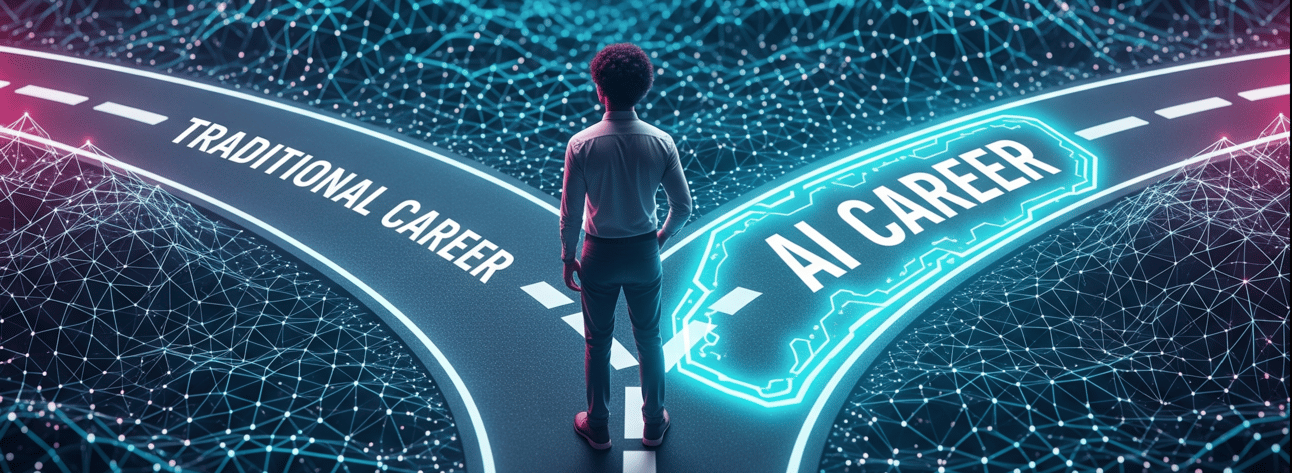- MakeMeExpert
- Posts
- How to Start Your AI Career
How to Start Your AI Career
A Simple Guide for Beginners

Artificial Intelligence (AI) is one of the most exciting career fields right now. Jobs in this area are growing super fast - experts predict they'll grow by 26% in the next 10 years. Some people even say AI will create more jobs than any other field in history. If you're just starting your career or thinking about switching fields, now is a great time to learn about AI.
What Is AI Really?
Think of AI as teaching computers to be smart like humans. Instead of just following instructions, AI helps computers learn, think, and make decisions on their own.
You probably use AI every day without realizing it:
When Netflix suggests movies you might like
When your email automatically sorts out spam
When you ask Siri a question
When your phone recognizes your face to unlock
AI has several main areas:
Machine Learning: Computers learn from examples (like how spam filters learn to spot junk email)
Computer Vision: Computers can "see" and understand pictures and videos
Natural Language Processing: Computers can understand and respond to human language
Robotics: Building smart machines that can move and work in the real world
Real-World Examples of AI Jobs
AI is already changing many industries:
Healthcare: AI helps doctors spot diseases earlier by looking at medical scans
Banking: AI catches credit card fraud by spotting unusual spending patterns
Transportation: Self-driving cars use AI to navigate safely
Entertainment: AI helps create music, art, and even movie scripts
What Kind of AI Jobs Are Out There?
The great news is you don't need to be a computer genius to work in AI. Here are some popular career paths:
Technical Roles:
AI Engineer: Builds AI systems that solve real problems (like creating a chatbot for customer service)
Data Scientist: Uses data to answer business questions (like predicting which products will sell best)
Data Engineer: Sets up the systems that collect and organize data for AI to use
Robotics Engineer: Designs and builds smart robots for factories or hospitals
Non-Technical Roles:
Product Manager: Decides what AI products to build and makes sure they meet people's needs
AI Ethics Specialist: Makes sure AI is fair and safe for everyone
AI Trainer: Teaches AI systems how to work properly
Business Analyst: Figures out how AI can help companies work better
What Skills Do You Need?
Technical Skills (Don't worry - you can learn these!):
Programming: Learning to write code (Python is a great starting language)
Basic Math: Understanding statistics and probability (think of it as the logic behind how AI makes decisions)
Data Handling: Learning how to work with large amounts of information
Soft Skills (You might already have these!):
Problem-solving: Being able to think through challenges step by step
Creativity: Coming up with new ideas and solutions
Communication: Explaining complex ideas in simple terms
Curiosity: Always wanting to learn new things
How to Learn AI Skills
Self-Learning (This is huge in AI!):
Free Online Courses: Websites like Coursera, edX, and YouTube have thousands of AI courses
Books and Blogs: Start with beginner-friendly AI books and follow AI news websites
Podcasts: Listen to AI experts share their knowledge during your commute
Online Communities: Join forums where people discuss AI and ask questions
Learning Path for Beginners:
Start with basic computer skills if you're not comfortable with technology
Learn basic programming (Python is most popular for AI)
Take an introductory machine learning course
Practice with simple projects
Keep learning more advanced topics
Building Real Experience
Start Small:
Create simple projects like a basic chatbot or analyze data from your favorite hobby
Put your projects on GitHub (a website where programmers share their work)
Even small projects show employers you can learn and build things
Staying Current
AI changes fast. New tools and techniques appear all the time. To stay relevant:
Follow AI news websites and blogs
Take new courses regularly
Experiment with new AI tools as they come out
Join professional organizations
Attend workshops and webinars
Remember This
Everyone starts as a beginner - even the top AI experts were once where you are now
You don't need to be a math genius - many successful AI professionals learned math along the way
The field needs diverse perspectives - your unique background and experiences are valuable
Learning never stops - but that's what makes AI exciting and rewarding
Small steps add up - every tutorial watched and every line of code written gets you closer to your goal
Final Thoughts
Starting an AI career might seem overwhelming, but thousands of people make this transition every year. The key is to start where you are, use what you have, and do what you can.
Whether you're a recent college graduate, switching careers, or just curious about AI, there's a place for you in this exciting field. The future of AI is being built by people from all backgrounds - artists, teachers, business professionals, and yes, complete beginners.
Your AI journey starts with a single step. Take that step today, and stay curious about tomorrow. The world of AI is waiting for what you'll bring to it.